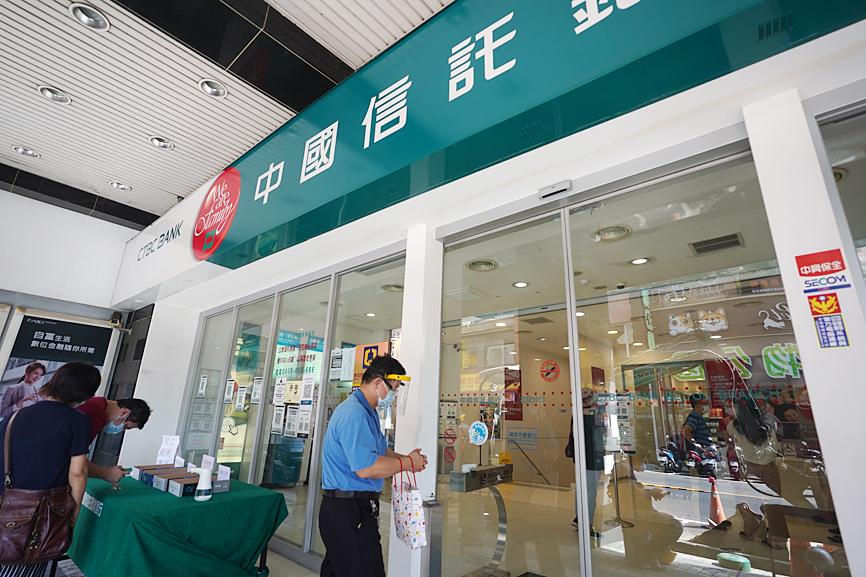CTBC Bank (中國信託銀行) yesterday reported an annual increase in New Taiwan dollar-denominated loans and net fee income in the second quarter, despite the local COVID-19 outbreak.
The banking arm and main profit engine of CTBC Financial Holding Co (中信金控) reported that its NT dollar-denominated corporate loans, mortgages and unsecured consumer loans rose annually by 21.7 percent to NT$692 billion (US$24.73 billion), 11 percent to NT$798 billion and 18 percent to NT$193 billion respectively.
OVERSEAS BRANCHES

Photo: CNA
In contrast, the bank’s foreign currency-denominated lending fell 9 percent year-on-year to NT$930 billion, as its overseas branches were more conservative about approving new loans amid the COVID-19 pandemic, it told an investors’ conference.
The bank’s net interest margin, a gauge of its profitability, was 1.39 percent last quarter, flat from a quarter earlier, but down from 1.44 percent a year earlier, while its non-performing loan ratio dropped from 0.48 percent a quarter earlier to 0.4 percent as of the end of June, company data showed.
FEE INCOME
The bank’s net fee income expanded 11.8 percent annually to NT$8.03 billion, as fee income from its wealth management business and corporate banking grew 24.8 percent to NT$4.27 billion and 22 percent to NT$939 million respectively, offsetting declines reported by its credit card and consumer banking businesses.
VOUCHER PROGRAM
Asked about how the government’s proposed “quintuple stimulus voucher” program would boost the local economy, CTBC Financial said it estimated that the program would trigger additional consumption of NT$120 billion, which would help raise the nation’s GDP by 0.4 to 0.5 percent.
However, as the vouchers would reportedly be distributed in October, they might have less of an effect on the economy than last year’s Triple Stimulus Vouchers, which were distributed in July, a peak spending season, CTBC Financial spokeswoman Chiu Ya-ling (邱雅玲) said.

CAUTIOUS RECOVERY: While the manufacturing sector returned to growth amid the US-China trade truce, firms remain wary as uncertainty clouds the outlook, the CIER said The local manufacturing sector returned to expansion last month, as the official purchasing managers’ index (PMI) rose 2.1 points to 51.0, driven by a temporary easing in US-China trade tensions, the Chung-Hua Institution for Economic Research (CIER, 中華經濟研究院) said yesterday. The PMI gauges the health of the manufacturing industry, with readings above 50 indicating expansion and those below 50 signaling contraction. “Firms are not as pessimistic as they were in April, but they remain far from optimistic,” CIER president Lien Hsien-ming (連賢明) said at a news conference. The full impact of US tariff decisions is unlikely to become clear until later this month

Popular vape brands such as Geek Bar might get more expensive in the US — if you can find them at all. Shipments of vapes from China to the US ground to a near halt last month from a year ago, official data showed, hit by US President Donald Trump’s tariffs and a crackdown on unauthorized e-cigarettes in the world’s biggest market for smoking alternatives. That includes Geek Bar, a brand of flavored vapes that is not authorized to sell in the US, but which had been widely available due to porous import controls. One retailer, who asked not to be named, because

CHIP DUTIES: TSMC said it voiced its concerns to Washington about tariffs, telling the US commerce department that it wants ‘fair treatment’ to protect its competitiveness Taiwan Semiconductor Manufacturing Co (TSMC, 台積電) yesterday reiterated robust business prospects for this year as strong artificial intelligence (AI) chip demand from Nvidia Corp and other customers would absorb the impacts of US tariffs. “The impact of tariffs would be indirect, as the custom tax is the importers’ responsibility, not the exporters,” TSMC chairman and chief executive officer C.C. Wei (魏哲家) said at the chipmaker’s annual shareholders’ meeting in Hsinchu City. TSMC’s business could be affected if people become reluctant to buy electronics due to inflated prices, Wei said. In addition, the chipmaker has voiced its concern to the US Department of Commerce

STILL LOADED: Last year’s richest person, Quanta Computer Inc chairman Barry Lam, dropped to second place despite an 8 percent increase in his wealth to US$12.6 billion Staff writer, with CNA Daniel Tsai (蔡明忠) and Richard Tsai (蔡明興), the brothers who run Fubon Group (富邦集團), topped the Forbes list of Taiwan’s 50 richest people this year, released on Wednesday in New York. The magazine said that a stronger New Taiwan dollar pushed the combined wealth of Taiwan’s 50 richest people up 13 percent, from US$174 billion to US$197 billion, with 36 of the people on the list seeing their wealth increase. That came as Taiwan’s economy grew 4.6 percent last year, its fastest pace in three years, driven by the strong performance of the semiconductor industry, the magazine said. The Tsai